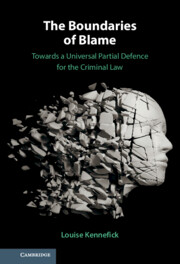The Boundaries of Blame
How can our criminal law retain legitimacy in an era of growing awareness about the complexities of human vulnerability and the far-reaching harm of punitive attitudes? The Boundaries of Blame makes a fresh contribution to the evolving scholarship on the relationship between criminal responsibility and social justice. It challenges the constricted view of personhood underpinning doctrines of responsibility, encouraging new conversations about long-standing questions on the role of circumstances like deprivation and trauma in excusing wrongdoing. Testing entrenched boundaries can provoke resistance, but the book argues that pushing past these limits is essential to fostering a more just framework of state blame in our present time and place.
To achieve this objective, Louise Kennefick proposes a bold yet pragmatic response in the form of a Universal Partial Defence, grounded in the Real Person Approach – a blueprint that offers a practical and humane pathway towards a fairer measure of criminal accountability.
Louise Kennefick is Senior Lecturer in Criminal Law at the University of Glasgow and researches across criminal law theory and criminal justice. She is a Glasgow Law Fellow and Irish Research Council Scholar, and her work appears in publications such as the Modern Law Review and Criminology and Criminal Justice.
